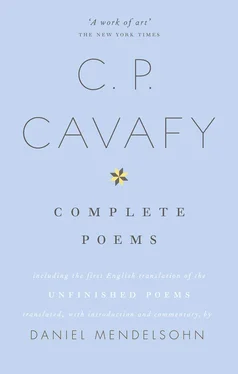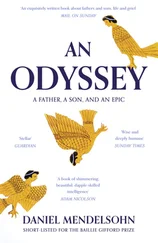The rich tension between furious human striving (political, intellectual, or erotic) in the present and the poignantly belated ability to assess the true significance of that striving indeed characterizes the most memorable of Cavafy’s poems. It is there in “Nero’s Deadline,” in which the thirty-year-old emperor, freshly back in Rome from a trip to hedonistic Greece, never dreams that “beware the age of seventy-three,” the Delphic oracle’s stern warning to him, refers not to him but to his aged general, Galba, plotting revolt in Spain, who will replace him on the imperial throne. It is there, too, in the dazzled and uncomprehending gawking on the part of the citizens of Seleucia, in “One of Their Gods,” who can’t possibly know that the stupefyingly beautiful youth whom they see passing through the marketplace on the way to the red-light district is actually one of the Greek gods. Quite typically of the great mature poetry, the confusion of the hapless observers within the poem mirrors a purposeful and productive confusion, for the reader, as to what era we are in, and indeed what order of being—human? divine? real? mythological?—we are reading about:
And as he disappeared beneath the arcades,
among the shadows and the evening lights,
making his way to the neighborhood that comes alive
only at night—that life of revels and debauch,
of every known intoxication and lust—
they’d wonder which of Them he really was
and for which of his suspect diversions
he’d come down to walk Seleucia’s streets
from his Venerable, Sacrosanct Abode.
Here we have another inscrutable apparition; and we have, too, the subtle, richly matured transformation of a theme from the early years: a message from the gods that only the elect can decipher.
The poet’s predilection for the historian’s perspective—his interest in the way in which the experiences of the present, always confusing as they occur, can only be properly understood in the future; which is to say, at the moment when the present has become the past—helps to explain why so many of the ostensibly erotic poems are, essentially, poems about the past, too. A significant number of poems about desire in the poet’s own time (or his recent past) are, in fact, cast as memories of love, or of desire. More often than not, when this poet speaks longingly of “skin, as if of jasmine” or eyes that are a “deep blue, sapphirine,” as he does in the 1914 lyric “Far Off,” he does so not as most conventional love poets might extol the virtues of their beloveds, but in his own distinctive way—which is to say, he speaks of them as a memory so far off that we cannot be sure whether the details of skin and eyes that he recalls are quite accurate:
I’d like to talk about that memory …
But by now it’s long died out … as if there’s nothing left:
because it lies far off, in the years of my first youth.
Skin, as if it had been made of jasmine …
That August—was it August?—evening …
I can just recall the eyes: they were, I daresay, blue …
Ah yes, blue: a deep blue, sapphirine.
Even in the most intensely erotic verses, poems in which the poet reveals that he knows “love’s body … the lips, / sensuous and rose-colored, of drunkenness,” as he does in the 1916 poem “One Night,” the celebration of the physical turns out to be a memory:
And there, in that common, vulgar bed
I had the body of love, I had the lips,
sensuous and rose-colored, of drunkenness—
the rose of such a drunkenness, that even now
as I write, after so many years have passed!,
in my solitary house, I am drunk again.
This poet very seldom writes what we usually think of as love poetry; his verse, which if anything tends to be about desire, is also—if not primarily—about the way in which the passage of time makes possible the poetry about desire that we are reading.
That Cavafy saw not only desirable young men but desire itself through a historian’s appraising eyes helps to account for a distinctive feature of his poetry. In sharp contrast to other Greek poets of his day, he notably shuns elaborate, exotic, or self-consciously “poetic” diction; his language, so famously plain, is striking above all for its lack of precision in descriptions of physical beauty—a choice of arresting significance in a poet greatly preoccupied with desire. More often than not he will resort to abstract adjectives— oréos and émorfos, “beautiful,” idanikós, “ideal,” exaísia, “exquisite,” idonikós, “sensual,” “voluptuous,” esthitikós, “refined,” “sensitive,” “aesthetic”—where another poet might seek to evoke greater detail.
We very seldom know, in fact, just what the beautiful young men in so many of Cavafy’s poems look like. In “One of Their Gods,” the figure seen walking through the marketplace of a great city is simply “tall and perfectly beautiful”; in “Before Time Could Alter Them,” the narrator’s reverie about a long-ago affair whose premature end may have been a blessing (since it preserves the memory of the lovers’ beauty “before Time could alter them”), the lover is described as a “beautiful boy,” oréo pedí. And the climactic vision to which “Days of 1908” inexorably leads—a glimpse of a ravishing youth who is the subject of the narrator’s fascinated gaze, after the boy has stripped for a seaside bathe—reveals only that he is
flawlessly beautiful; a thing of wonder.
His hair uncombed, rising from its peak;
his limbs a little colored by the sun
What is of interest to Cavafy is not so much individual beauty, but the idea of beauty itself—what happens to it when it is filtered through the passage of many years. Significantly, one of the few poems to include some particulars of what a beautiful young man might actually look like is a poem about beauty in the abstract: the short lyric “I’ve Gazed So Much” (whose original title, it’s worth noting, was “For Beauty”):
At beauty I have gazed so much
that my vision is filled with it.
The body’s lines. Red lips. Limbs made for pleasure.
Hair as if it were taken from Greek statues:
always lovely, even when it’s uncombed,
and falls, a bit, upon the gleaming brow.
The poet’s descriptive vocabulary, then, while narrow, has the supreme advantage of imparting to his imaginations of the beautiful an abstract, philosophical dimension—and, perhaps more important, of forcing his reader to do what the historian must do, which is to apply his own imaginative powers to subjects of which, so often, few details are extant.
Indeed, if the desire that flares in so many of these poems has, more often than not, been extinguished, the compensation for all those vanished or disappointed or broken-off love affairs is an artistic one: for we are always reminded that the poem itself is the vehicle for the preservation of desire, and of beauty, that otherwise would have disappeared. This important theme has its roots in the young poet’s debt to the Parnasse and to Baudelaire, with their elevation of the poet as a craftsman and seer whose gifts are denied to the common masses. A crucial aspect of this theme, developed as the poet evolved, was that the artistic creation ultimately has a life more substantial than the object that inspired it. Two decades after the early poems of the 1890s, with their heavy debt to those French poets, the theme recurs with greater subtlety, in suggestive ways. In the 1913 poem “In Stock,” for instance, a jeweler—a stand-in for the poet, of course—fashions fabulous pieces that may mimic nature, but are symbols of the superiority of his creative fantasy to any vulgar needs of the public:
Читать дальше












